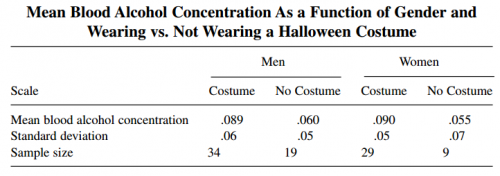Research on college student alcohol consumption shows that they drink significantly more when they link their drinking to a reason to celebrate. Halloween is one of the many “alcoholidays” that occur throughout the school year.
Psychologist Kent Glindemann and colleagues took measures of the blood alcohol concentration of college students on Halloween and a comparative non-holiday. As a measure of their investment in the celebration, the researchers also indicated whether the student was in costume on Halloween and asked the subject how much time and effort they spent putting it together.
They found that students on Halloween were significantly more intoxicated than they were on the non-holiday, significantly more intoxicated if they were in costume, and significantly more intoxicated if they had invested more versus less time in their appearance.
Glindemann and his colleagues theorize that the Halloween costume mediates the intent to celebrate, but costumes may also have an independent effect. Social work professor John D. Clapp and his colleagues studied non-holiday-related college parties. Such parties often have themes that encourage students to dress up. In theory, the themes apply to all students but in practice women dress up far more often than men.
Clapp and his colleagues found that women tested at themed parties had higher rates of intoxication than women at non-theme parties. Women may be de-inhibited by the costumes themselves or the costumes may make the party feel more like an alcoholiday.
Happy Halloween everybody! Celebrate safely!
Lisa Wade, PhD is an Associate Professor at Tulane University. She is the author of American Hookup, a book about college sexual culture; a textbook about gender; and a forthcoming introductory text: Terrible Magnificent Sociology. You can follow her on Twitter and Instagram.

Comments 1
Miss Disco — October 31, 2015
or its because halloween is a more widely accepted party night, so people are more free to drink then, whereas other times you probably won't all be partying.
i imagine you'd get similar information from christmas and new years compared to any other ordinary day too.